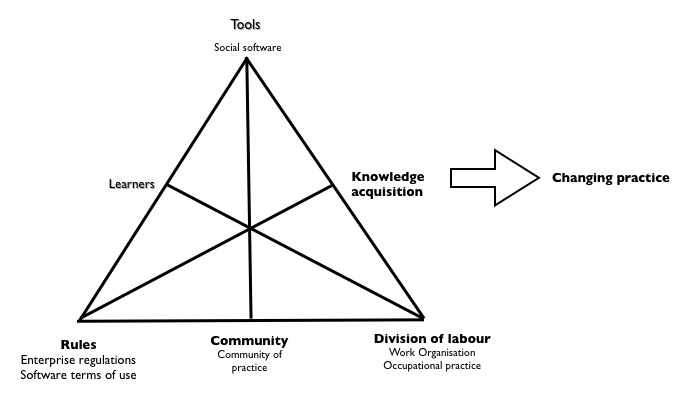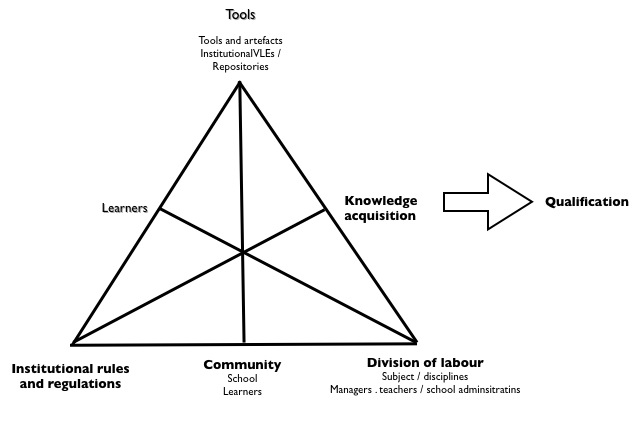In general I don’t like Christmas. Difficult travel, rampant consumerism, enforced jollity and all that kind of thing. But there is one thing I like about it and that is the peace away form day to day meetings to try and think and write a little. In this case I have an overdue short paper to deliver for the MatureIP project looking at teh work of Vygotsky and what we can learn from his work for knowledge maturing processes and for Personal Learning Environments.
Needless to say, I have not finished it yet and the more I read the more confused I seem to get.
The approach Vygotsky took to cognitive development is sociocultural, working on the assumption that ‘action is mediated and cannot be separated from the milieu in which it is carried out’ (Wertsch, 1991:18).Vygotsky considered that “higher mental functions are, by definition, culturally mediated.” Social processes give rise to individual processes and both are essentially mediated by artefacts.
Furthermore Vygotsky held that “environment cannot be regarded as a static entity and one which is peripheral in relation co development, but must be seen as changeable and dynamic.” The social cultural approach to learning has been extended through Activity Theory and I find that interesting in the context of comparing formal education and the use of tools compared to informal learning in social networks. Within an activity system tools or instruments – including technologies – are considered to be mediating elements.
First lets look at formal education. Formal education systems are heavily rule bound, with rule determining both the contents and usually the process of learning. The divisions of labour are strongly defined, especially with regard to the roles of managers and teachers within teh system. the community is that of the institution, which once more is heavily prescriptive regarding tools and objects with outcomes frequently being seen as formal acquisition of qualifications. In this subject – or learner – situation the selection of the tools which mediate the learning. Indeed in this activity system the selection of tools is intended more to preserve the rules and the division of labour and to contain the outcomes, than it is to support learning per se.

Then lets compare that with the use of social software for learning in the workplace. Firstly the division of labour is very different and more likely to be influenced by work place divisions than that of teachers. In this respect if the object is knowledge acquisition the outcomes may well be bounded by work processes, for instance through the need to solve a problem or through the introduction of new technologies or innovation in the workplace. The division of labour still remains important to the activity, especially the object, in permitting or restraining the time and the access of the subject to the tools they need to undertake the activity. However it is important to note that Vykotsky saw learning as taking place in Zones of Proximal development and to be influenced by the interventions of a Significant Other Person. This could be a teacher, a trainer, a peer. However this process is once more mediated by instruments or tools thus meaning that significant person or persons could be supporting learning through a forum or through a Personal Learning Network.
Once more the tools will mediate the activity of learning. But here the prescription may be less in that the community itself will influence the tools and may be a broader community of learners or a community of practice, recommending tools based on a collective experience. However, rules may still apply especially through the Terms and Conditions of Service and use of any particular social software service. In the context of the tools, Vygotsky considered that all artefacts are culturally, historically and institutionally situated. “In a sense, then, there is no way not to be socioculturally situated when carrying out an action. Conversely there is no tool that is adequate to all tasks, and there is no universally appropriate form of cultural mediation. Even language, the ‘tool of tools’ is no exception to this rule”. (Cole and Wertsch).
In terms of informal learning and work based learning, the tools are less likely to be culturally bound to the institution of the school. Thus more often we may see the appropriation of cultural tools or artefacts used in wider society and repurposed for learning, than the use of explicitly ‘educational software’. But over a period of time, as the practice of the use of such tools for learning becomes culturally embedded within society, it may start to influence the selection of tools and instruments for learning within institutions framed through the rules and division of labour of the education systems.
Sorry if all this is not too clear. But I would very much welcome any feedback ![]()
